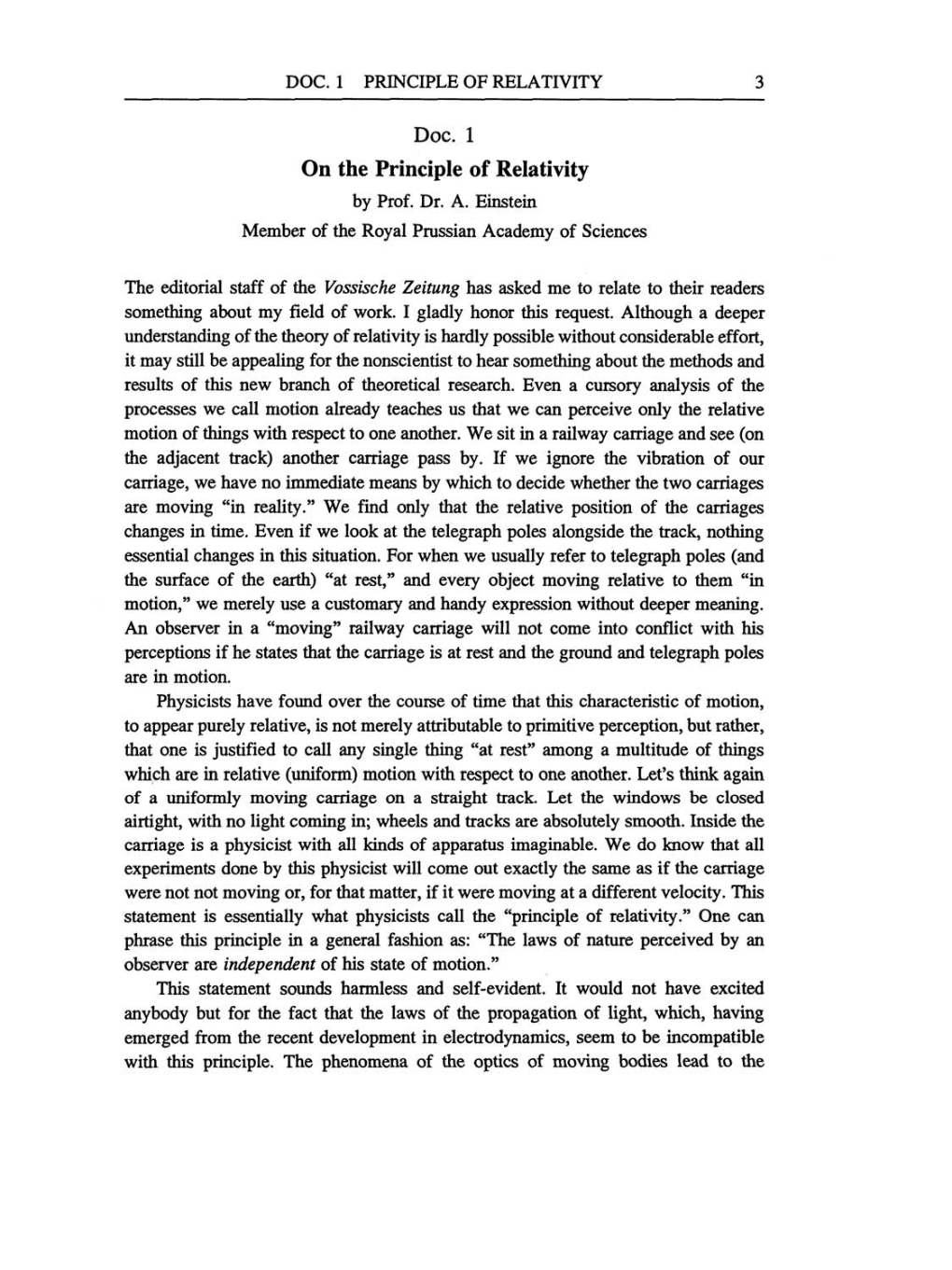DOC.
1
PRINCIPLE OF RELATIVITY
3
Doc.
1
On the
Principle
of
Relativity
by
Prof.
Dr. A. Einstein
Member of the
Royal
Prussian
Academy
of Sciences
The editorial staff of the
Vossische
Zeitung
has asked
me
to
relate to their readers
something
about
my
field
of
work.
I
gladly
honor this
request. Although
a deeper
understanding
of the
theory
of
relativity
is
hardly possible
without considerable
effort,
it
may
still be
appealing
for the
nonscientist to hear
something
about the methods and
results
of
this
new
branch
of
theoretical research.
Even
a
cursory analysis
of
the
processes
we
call motion
already
teaches
us
that
we can
perceive only
the relative
motion
of
things
with
respect
to
one
another. We sit in
a railway carriage
and
see (on
the
adjacent
track)
another
carriage pass
by.
If
we ignore
the vibration of
our
carriage, we
have
no
immediate
means by
which to decide whether the two
carriages
are moving
"in
reality."
We
find
only
that the relative
position
of
the
carriages
changes
in time. Even
if
we
look at the
telegraph
poles
alongside
the
track,
nothing
essential
changes
in this situation. For when
we
usually
refer
to
telegraph poles (and
the surface
of
the
earth)
"at
rest,"
and
every object moving
relative
to
them "in
motion,"
we merely
use
a
customary
and
handy expression
without
deeper meaning.
An observer in
a
"moving" railway carriage
will not
come
into conflict with
his
perceptions
if
he states that the
carriage
is
at
rest and the
ground
and
telegraph poles
are
in motion.
Physicists
have found
over
the
course
of
time that this characteristic of
motion,
to
appear purely
relative,
is
not
merely
attributable
to
primitive
perception,
but
rather,
that
one
is
justified
to
call
any single thing
"at rest"
among
a
multitude of
things
which
are
in relative
(uniform)
motion with
respect
to
one
another. Let's think
again
of
a
uniformly moving carriage
on a
straight
track. Let the windows be closed
airtight,
with
no light coming
in;
wheels and tracks
are absolutely
smooth. Inside the
carriage
is
a
physicist
with
all
kinds of
apparatus imaginable.
We do know that all
experiments
done
by
this
physicist
will
come
out
exactly
the
same as
if
the
carriage
were
not
not
moving
or,
for that
matter,
if
it
were
moving
at
a
different
velocity.
This
statement
is
essentially
what
physicists
call the
"principle
of
relativity."
One
can
phrase
this
principle
in
a
general
fashion
as:
"The laws
of
nature
perceived by
an
observer
are independent
of
his state
of
motion."
This statement sounds harmless and self-evident. It would not
have
excited
anybody
but for the fact that the laws of the
propagation
of
light,
which, having
emerged
from the recent
development
in
electrodynamics, seem
to
be
incompatible
with this
principle.
The
phenomena
of the
optics
of
moving
bodies lead
to
the
